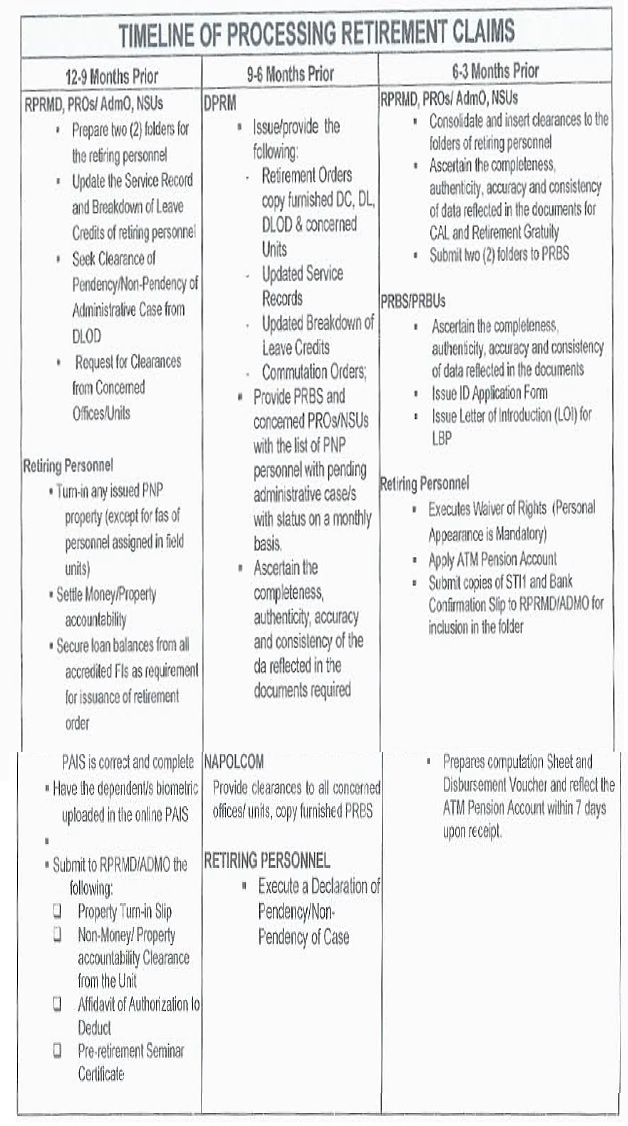
Now that you have reached the last day of your duty as a public servant, we would like to thank you for your service to our country and for all the personal sacrifices you have made while serving the nation. We know that your job requires a lot of sacrifice and patience — patience in the sense that you have to swallow your pride over arrogant civilians because your family and loved ones are always waiting for your return.
If you have been serving for at least 20 years, then you can apply for an optional retirement .
Note :
Compulsory retirement age – 56 years old.
Optional retirement – must have served at least 20 years
In this article, we’ll walk you through how to process and compute your retirement claims.
How to process your PNP Retirement Claim
The following tasks must be completed by retiring PNP personnel:
a. one year before the retirement’s effective date.
a.1) Turn in any PNP property/equipment and obtain a Non-Property Accountability Clearance EXCEPT for those assigned to field units, where a provisional clearance will be issued;
a.2) Check that the information in your online PAIS is CORRECT and COMPLETE; and
a.3) Have the biometric/s of dependent/s uploaded in the online PAIS.
b. Submit the following to RPRMDs/ARMDs upon receipt of a Retirement Order:
b.1) Affidavit of Authorization to Deduct allowing the PNP to deduct accountabilities from retirement benefits for those who have accountabilities.
b.2) Pre-retirement seminar certificate
b.3) File the ending SALN 30 days after retirement with your respective RPRMDs/ARMDs, who will then submit it to the RMD, DPRM, and PRBS. This SALN is different from that required in the claims folder which is the latest SALN submitted.

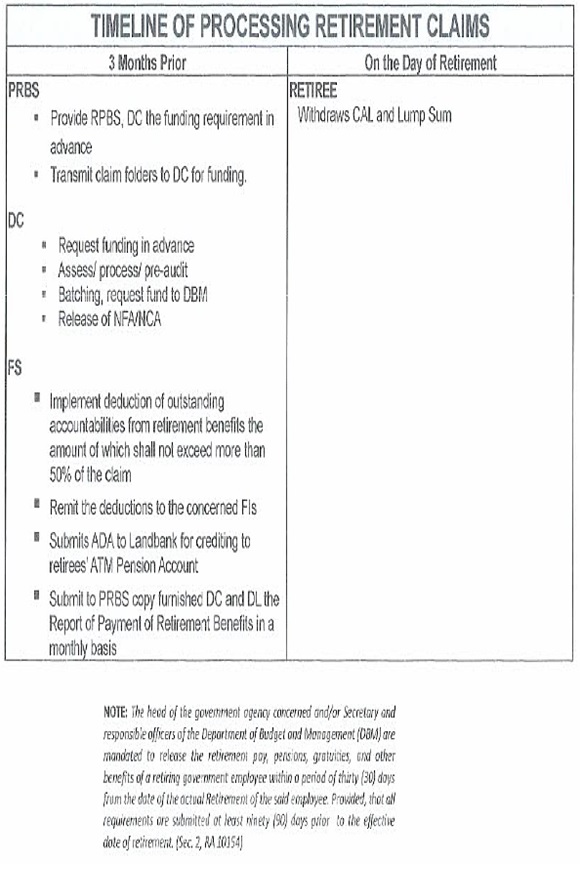
a.) Compulsory Retirement
It shall be upon attainment of age fifty-six (56) for officer and non-officer: Provided, That, in case of any officer with the rank of Chief Superintendent ( Police Brigadier General ), Director ( Police General) Or Deputy Director General ( Police Lieutenant General ), the Commission may allow his retention in the service for an inextensible period of one (1) year.
b.) Optional Retirement
Upon accumulation of at least twenty (20) years of satisfactory active service, an officer or non-officer, at his own request and with the approval of the Commission, shall be retired from the service and entitled to receive benefits provided by law (Ref: Sec 40 RA 6975).
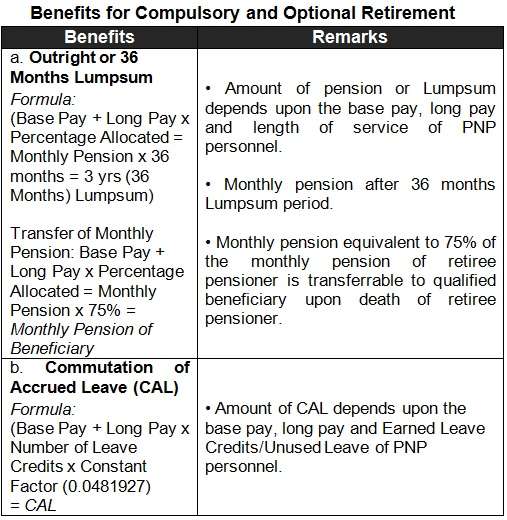

c.) Total Permanent Physical Disability (TPPD)
An officer or non-officer who is permanently and totally disabled as a result of injuries suffered or sickness contracted in the performance of his duty as duly certified by National Police Commission, upon finding and certification by the appropriate medical officer, that the extent of the disability or sickness renders such member unfit or unable to further perform the duties of his position, shall be entitled to one (1) year salary and lifetime pension equivalent to eighty percent (80%) of his last salary, in addition to other benefits as provided under existing laws
Should such member who has been retired under permanent total disability under this section die within five (5) years from his retirement, his/her surviving legal spouse of if there be none, the surviving dependent legitimate children shall be entitled to the pension for the remainder of the five (5) years guaranteed period.
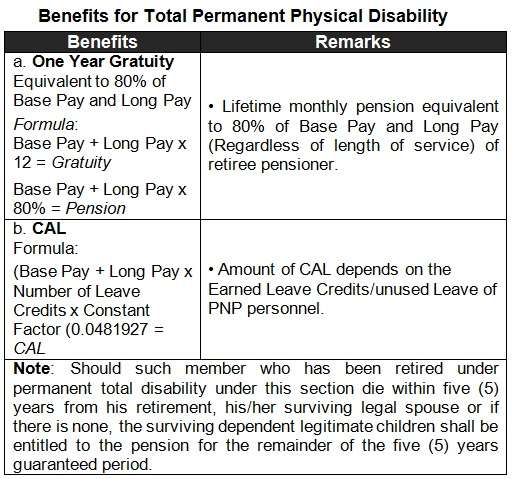
d.) Death and Disability Benefits
A uniformed personnel and/or his heirs shall be entitled to all benefits relative to the death or permanent incapacity of said personnel, as provided for under this Act, and/or other existing laws. (Ref Section 76, RA 6975) “An officer or non-officer with at least twenty (20) years of active service who dies in line of duty shall be considered compulsory retired for survivorship benefits.
The Survivors of an officer or non-officer retired under this Section shall be entitled to a monthly annuity equivalent to 50% of Base Pay & Long Pay based on the grade next higher than the separation grade, to be divided equally among the survivors with the right for accretion.
NOTE : Applies to posthumously retired PNP personnel died in line of duty with at least 20 yrs of active service. “An officer or non-officer with less than twenty (20) years of active service who dies in line of duty shall be considered separated for survivorship benefits” (Ref: Section 10, NAPOLCOM BOR No. 8). “The Survivors of an officer or non-officer separated under this Section 10 shall be entitled to a monthly annuity equivalent to 50% of Base Pay & Long Pay based on his separation grade, to be divided equally among the survivors”. (Ref: Section 15 of NAPOLCOM Board of Officers Resolution No. 8)
NOTE : Applies to posthumously retired PNP personnel died in line of duty with less than 20 yrs of active service.
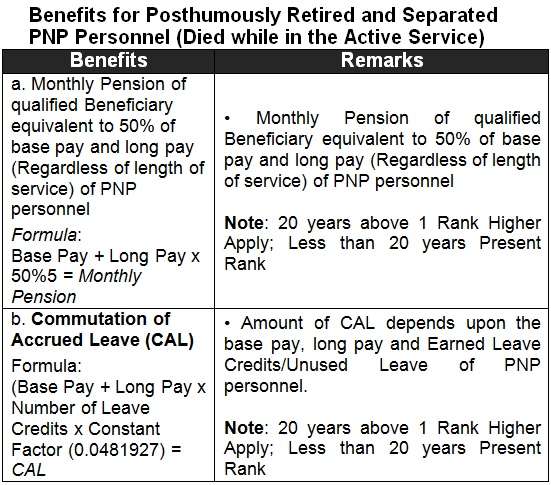
Note : Qualified beneficiary (Ref: Section 25 of NAPOLCOM Board of Officers Resolution No 8 as amended by NAPOLCOM Resolution No. 2007-376)
Survivor/Transferee shall mean:
1) Surviving spouse legally married to the deceased prior to the latter’s retirement/ separation, not legally separated by judicial decree issued on grounds not attributable to said spouse, and who have not abandoned the deceased without justifiable cause: Provided, that entitlement to benefits shall automatically terminate upon re-marriage of the surviving spouse;
2) Surviving legitimate, legitimated, legally adopted children, including the illegitimate children, who are unmarried not of majority age (18 years old) , or is over the age of majority but incapacitated and incapable of self-support due to a mental or physical defect acquired prior to the age of majority. The share of an illegitimate shall be equivalent to one-half (1/2) of a legitimate child. Provided, that the entitlement to benefits shall terminate upon the attainment by the capacitated children of the majority age or upon contracting a marriage, whichever comes first; and
3) In default of those mentioned in paragraphs 1 and 2 above, the surviving parent or parents, or in default thereof, the surviving unmarried brothers and/or sisters not of majority age.
e. Separation/Dropped from the Rolls/Dismissed/ Resignation/ Attrition
1) Separation
It refers to the termination of employment and official relations of a PNP member who rendered less than twenty (20) years of active service in the government with payment of corresponding benefits (Ref: Section 37 of Civil Service Commission)
CAL= Base Pay + Long Pay x Number of Leave Credits x Constant Factor (0.0481927)
2) Dropped from the Rolls
It refers to officers and employees who are either habitually absent or have unsatisfactory or poor performance or have shown to be physically and mentally unfit to perform their duties (Ref: Revised Omnibus Rules on Appointments and Other personnel Actions – Dec 2009)
CAL= Base Pay + Long Pay x Number of Leave Credits x Constant Factor (0.0481927)
3) Dismissed
It refers to separation of the personnel in the police service as a result of his case, shall carry it that cancellation of eligibility, forfeiture of retirement benefits, and the disqualification in the re-employment in the government service (Ref: Revised Omnibus Rules on Appointments and Other personnel Actions – Dec 2009).
CAL= Base Pay + Long Pay x Number of Leave Credits x Constant Factor (0.0481927)
4) Resigned
It is a formal act of giving up or quitting one’s office or position.
CAL= Base Pay + Long Pay x Number of Leave Credits x Constant Factor (0.0481927)
5) Attrition
It is the retirement or separation in the police service of PNP Uniformed Personnel pursuant to any of the means mentioned below (Ref: Sections 24 to 29 of RA No 8551).
a) Attrition by attainment of maximum tenure in position;
b) Attrition by relief;
c) Attrition by demotion in position;
d) Attrition by non-promotion; and
e) Attrition by other means.
CAL= Base Pay + Long Pay x Number of Leave Credits x Constant Factor (0.0481927)